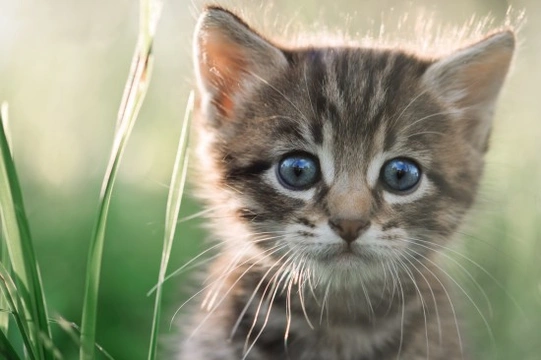
Kitten Emergencies - Signs to look out for
Getting a new kitten can be great fun, but one of the first things that we all realise when we first bring a new kitten home is just how fragile, small and delicate they really are. Kittens are much more vulnerable to illnesses and injuries than fully-grown cats, as their bones and joints are still developing, and they will not have had the chance to fully build up their immune systems.
However, there is a fine line between panicking over every minor incident and ailment, and identifying a real kitten emergency that means your kitten will need to see the vet! Read on to learn more about some common kitten problems that can quickly worsen, in order to be on the lookout for potential risks to your kitten’s health.
Breathing problems
Breathing difficulties of any type should be considered a veterinary emergency, particularly in young kittens. If your kitten is struggling to breathe, breathing noisily or appears to be coughing up a lot of fluid, they will need to see the vet. The underlying cause of breathing difficulties in kittens can be numerous, from foreign body ingestion to asthma to heart problems.
If you have a Persian kitten or another breed with a short, squashed face, their breathing might be rather noisier than normal, but nonetheless, you should get your vet to examine them to find out what is and is not normal for your own kitten.
Choking and coughing
Seeing any person or animal apparently choking can be very frightening, particularly in the case of a small kitten that is very delicate to start with. Choking can be due to a piece of food that has gone down the wrong way, an ingested foreign body, or a range of health conditions.
If your kitten simply coughs once or twice this is not a problem, but if your kitten appears to be choking or coughing constantly, it is time to call the vet, whatever time of day it is.
Injuries
Small, delicate kittens are actually rather more robust than they look, but even so, they are still fragile and easily hurt by injuries. If your kitten limps, is stepped on inadvertently or gets into a scrap with another cat, take them to the vet in order to get checked out. Any falls from height or incidents where they are hit by a vehicle must also necessitate a prompt veterinary visit.
Sickness
Just like children, kittens may succumb to minor illnesses now and then, which can lead to diarrhoea, vomiting or both. If your kitten is still able to drink water and is only mildly sick for 24 hours or less, this will generally resolve itself, but for more serious sicknesses, contact your vet.
If your kitten cannot drink water, appears to be in pain or is still sick after 24 hours, they need to get examined and treated.
Foreign bodies
Kittens love to play, and of course, they are very much attracted to things that move and can be chased, such as ribbons and string. It is important to kitten-proof your house to ensure that your kitten cannot get their paws on anything that might harm them, but even so, it is possible that your kitten might get their teeth into something and ingest something harmful. String can be swallowed, as can parts of smaller toys, which can all potentially cause illness, blockages and problems.
If you know or suspect that your kitten has eaten or swallowed something that they shouldn’t, take them along to the vet.
Toxins
Kittens are generally fairly sensible about keeping clear of things that they can eat that might harm them, and most things that are toxic are unpalatable to cats.
However, some apparently innocuous looking things such as lilies are poisonous to cats, and it is vitally important to find out about feline toxins, and remove them from your home before your kitten comes into it.
If you know or suspect that your kitten has ingested something toxic or that appears to have made them sick, contact your vet.
Allergic reactions
Some cats may prove to be allergic to various things, from colourings in their food to pollen in the garden! This is something that you will usually find out about while your kitten is young, and the first time that your cat manifests an allergic reaction to something, it can be unnerving. Not all allergies are serious, and some can be managed, but if your kitten suffers from a very pronounced allergic reaction to something, this might make them quite sick quite quickly.
High temperature
If your kitten is running a fever, this can indicate a range of underlying conditions, ranging from the mild to the serious. The healthy temperature of the cat is between 37.7 and 39.1 degrees Celsius, and if your kitten’s temperature is markedly higher than this, there might be something amiss.
As a high temperature can indicate a range of potential illnesses, it is important to get your vet to check your kitten out to ensure that they are ok.



